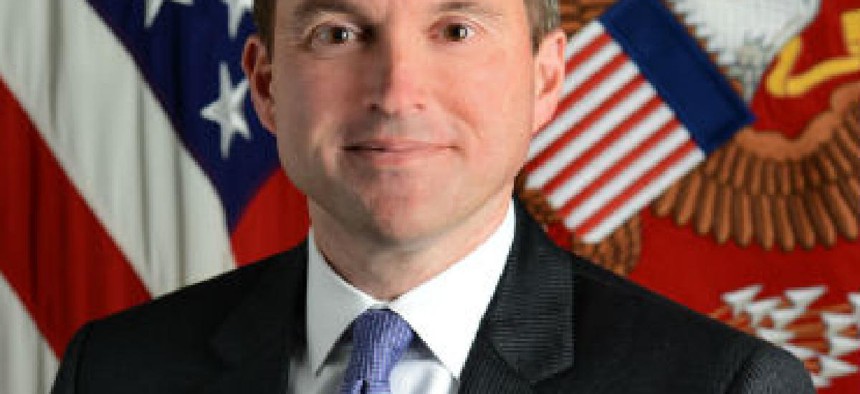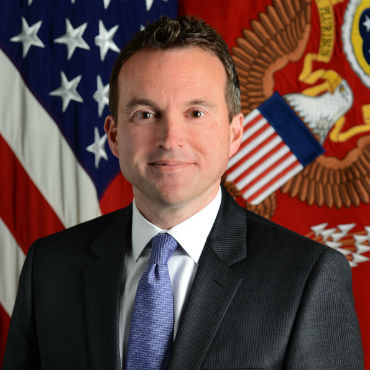Army introduces new rapid tech office

The Army is launching a new Rapid Capabilities Office designed to address its shrinking superiority in critical areas such as electronic warfare and cyber.

Secretary of the Army Eric Fanning said cyber will be a primary focus of the new office because it "has a low barrier for entry for our adversaries."
The Army is launching a new Rapid Capabilities Office to address what it says is a decreasing military superiority over potential enemies.
"It's clear as we watch our adversaries that they have studied our capabilities, they've looked for vulnerabilities, [and] they've embarked on ambitious modernization efforts to narrow the technological gap between our forces," Secretary of the Army Eric Fanning said at an Aug. 31 event hosted by Bloomberg.
"We have a higher threshold being the world's sole superpower," he added. "Other countries just need to jam us or to deny us, and so they are finding creative ways to degrade these capabilities or even shut them down for us. And...we've got to figure out how to counter that or fight without that or around it."
The RCO is designed to address those challenges, Fanning said. The goal is to get capabilities to the warfighter as quickly as possible and make the acquisition process more agile and efficient.
The existing Rapid Equipping Force is tasked with getting hardware and systems into the field as quickly as possible -- generally within 180 days -- the RCO will focus on providing capabilities in a one- to five-year time frame.
"The office will execute rapid prototyping and initial equipping in electronic warfare, cyber, survivability and position, navigation and timing," Fanning said.
Concerns about Russia's operations in Ukraine and Syria contributed to the RCO's creation. In those battle zones, Russia has deployed a combination of unmanned aerial systems, offensive cyber and advanced electronic warfare capabilities.
"In Iraq and Syria,...we have contested airspace when we never had that before," said Brig. Gen. Walter Piatt, who will serve as the RCO's deputy director for operations. "So the enemy is able to rapidly produce and field commercial off-the-shelf technology with small drones and be able to employ them in a militarily effective way, so that is a need statement that we have not addressed."
Fanning said the U.S. military is not able to develop needed technology as quickly as it once did. "There are a lot of companies on the West Coast that just don't want to work with us because we make it too difficult," he added.
The RCO will lean heavily on industry to provide solutions and capabilities, which could mean better using existing technologies as well as developing new ones. "To that end, the Army RCO will engage directly and continuously with the commercial sector -- from our longtime partners in the defense industry to small micro companies that are so often the leading edge of technologies," Fanning added.
Fanning, who will serve as chairman of the board of directors, said the office will have a short chain of command and will seek to streamline the acquisition process to be more welcoming to the most advanced technology firms. It will use a mix of traditional contracting mechanisms and more flexible approaches with the goal of quickly responding to changing technology and demands in the field.
Cyber will be one of the RCO's primary areas of focus. "Cyber has a low barrier for entry for our adversaries," Fanning said. "We built it into all of our platforms across the [Defense Department] not necessarily thinking about how that might be turned against us."
Katrina McFarland, acting assistant secretary of the Army for acquisition, logistics and technology, said the government needs to focus on being a good cyber customer, in part by knowing what it wants when it's working with industry. She added that a risk management framework is essential to determining the Army's needs and where it should be spending its resources.
"The RCO really needs to focus on how it's going to be able to help the organization at an enterprise level where it has that visibility [and] focus in on where cyber needs to be," she said.
The RCO will work closely with the Army's new cyber directorate to focus on defensive operations -- protecting Army networks and developing the infrastructure needed to protect the mission in the field.
Officials would not go into details about the budget for the RCO but said mechanisms are in place for fiscal 2017. In future years, officials will work with Congress to fund the office through more traditional means.
Piatt stressed that the RCO isn't focused on "more money and more people" but rather on better using existing technologies to assist warfighters.
Fanning said the office will serve as a bridge between the Rapid Equipping Force and other programs that are focused on long-term platforms.
"We're not aiming for the perfect solution that will field the entire army 15 or 20 years down the line," he said. "This office is focused on closing capability gaps where we know there are technologies out there today that can make a difference -- inside the Army or without."
NEXT STORY: Buying event helps museum save on computers


